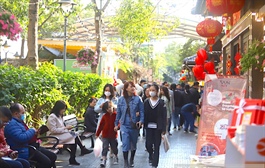Ho Chi Minh City food enterprises hope expansion is key
Ho Chi Minh City food enterprises hope expansion is key
With increasing costs and decreasing orders among the difficulties facing the food production industry in 2023, many enterprises in Ho Chi Minh City are choosing to expand the market.

In 2022, Ho Chi Minh City's industrial food production recorded a significant increase of 30.5 per cent on-year. However, the industry is facing many fresh challenges this year due to fluctuations in the global economy affecting export markets and a slowdown in economic growth.
Phan Van Co, marketing director of Vrice Group, said, "Since the beginning of the year, the cost of materials for rice production has increased considerably, by 3-5 per cent. While the price of rice has increased in many countries around the world, it has not increased as it has in the Vietnamese market, making it difficult for Vietnamese rice exporters to compete."
In 2023, industry and trade in Ho Chi Minh City will strive for an increase in the index of industrial production of 7.5 per cent; growth in the total retail sales of social consumer goods of 12 per cent; and a 10 per cent jump in exports, excluding crude oil, through the city's port.
The targets were set while taking such difficulties as the ease of accessing credit and the continued increase in the cost of raw materials into account. In addition, the prolonged disruption of the global supply chain has put great pressure on production activities, and poses more challenges to the food production industry and the larger economy in general.
According to Van Co, if the price of rice continues to increase, the white rice business with popular rice destinations such as the Philippines, and Indonesia will be greatly affected as it suffers from high-level competition from India and Pakistan. “In 2022, we exported a lot of rice orders to Australia, New Zealand, Singapore, and the Middle East. In 2023, enterprises will increase production of jasmine rice, Japanese rice, and so on, while we will grow less white and glutinous rice," said Co.
Businesses also plan to reduce unnecessary costs, find new sources of raw materials, and create supply chains from factories to consumers to control prices.
According to Le Van May, chair of Lotus Group, escalating inflation, increasing interest rates, fluctuating raw material prices, and a reduction in orders are challenges for businesses from the very start of the year.
“We have learned from our experiences in the pandemic that in all situations, businesses need to stay optimistic and prepare response scenarios. We have found some new customers in Australia and South Korea, so export activities are still growing," said Le Van May. She asserted that expanding the market is an important factor for businesses to overcome difficulties.
Nguyen Hai Dang, director of Xlife International said, “We predict that the economy in 2023 will grow slowly, but this is the time for businesses to review and improve product quality. In 2021-2022, we focused on quantity, but now we tend to focus on improving product quality to retain customers."
Responding to this situation, Ly Kim Chi, president of the Food and Foodstuff Association, suggested, "the city needs to urge promotion and connect activities to promote the strength of the business community. Following that, it is necessary to organise many programmes to introduce goods to provinces and cities and connect with localities that have large raw material production areas."





















